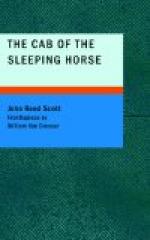The episode of the cab of the sleeping horse was leading on to—what?
Three men in the Collingwood knew of the occurrence, yet no one had come in or gone out, and no one had telephoned. Moreover, they also knew of Harleston’s part in the matter. The girl had not lied, he was sure; therefore they must have gained entrance from the outside; and, possibly, were now hiding in the Chartrand apartment—if the telephone message to No. 401 had to do with the occupant of the deserted cab and the lost letter. Yet how to connect things? And why bother to connect them?
He did not care for the vanished lady of the cab—he had the letter and the photograph; and because of them he was to have a talk with an interesting young woman at five o’clock that afternoon. The cipher letter, which was the much desired quantity, was safely across the hall, waiting to be turned over to Carpenter, the expert of the State Department, for translation. Meanwhile, what concerned Harleston was the photograph of Madeline Spencer and her connection with the case—and to know if the United States was concerned in the affair.
At this point he turned over and calmly went to sleep. Tomorrow was another day.
He was aroused by a vigorous pounding on the corridor door. It was seven-thirty o’clock. He yawned and responded to the summons—which grew more insistent with every pound.
It was Stuart—the envelope and the flowers in his hand.
“Scarcely heard your gentle tap,” Harleston remarked. “Why don’t you knock like a man?”
“Here’s your damn bouquet, also your envelope,” said Stuart, “You probably don’t recall that you left them with me about two this morning. I do.”
“I’m mighty much obliged, old man,” Harleston responded. “You did me a great service by taking them—I’ll tell you about it later.”
“Hump!” grunted Stuart. “I hope you’ll come around to tell me at a more seasonable hour. So long!”
Harleston closed the door, and was half-way across the living-room when there came another knock.
Tossing the envelope and the faded roses on a nearby table, he stepped back and swung open the door.
Instantly, a revolver was shoved into his face, and Crenshaw sprang into the hall and closed the door.
“I thought as much!” he exclaimed. “I’ll take that envelope, my friend, and be quick about it.”
“What envelope?” Harleston inquired pleasantly, never seeming to notice the menacing automatic.
“Come, no trifling!” Crenshaw snapped. “The envelope that the man from the apartment across the corridor just handed you.”
Harleston laughed. “You are obsessed with the notion that I have something of yours, Mr. Crenshaw.”
“The letter!” exclaimed Crenshaw.
“That envelope is addressed to me, sir; it’s not the one you seem to want.”
“I suppose the flowers are also addressed to you,” Crenshaw derided, advancing. “Get back, sir,—I’ll get the envelope myself.”




